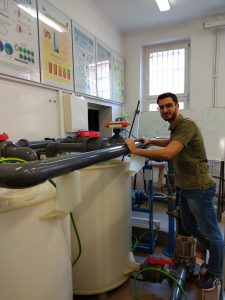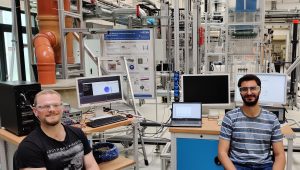Optimized controlled inline fluid separation
Fellow: Matheus Martinez Garcia (ESR 4)
Host: Delft University of Technology (The Netherlands)
Main Supervisor: Dr. L. M. Portela
Background:
There are several ways to separate two fluids with distinct densities. The centripetal acceleration can be used to generate accelerations much larger than gravity, leading to a huge gain in the size of the equipment. However, the rotational motion generates complex turbulent structures, and, depending on the conditions, hydrodynamic instabilities. Moreover, the higher the centripetal acceleration, the higher the stress at the interface between the dispersed and continuous phase, which cause the breakup of the dispersed phase into smaller particles, that are harder to separate. The proper sizing of an inline swirl separator must balance all these effects. If we consider a quick control system actuation in the process, as this project proposes, more effects take place. The quick change in the flow direction due to the control system actuation also generates a stress in the interfaces between the phases, which means smaller elements. Also, a sudden change in the pressure of the system may lead to an instable flow, spreading the light phase all over the pipe, and impacting the separation efficiency. To avoid the generation of emulsion, and to focus on the effects caused by fast changes in the flow inside the separator, it was decided to change the pair of fluids of the previous studies (oil-brine) to air-water. If the project ended up being successful, the approach may be extended to other fluid pairs.
Research Activities / Objectives:
- Design and build a flow loop for the experiments
- Study experimentally which variables mostly affect the separation in a swirl flow
- Develop a control strategy of the process based on the most influent variables
- Develop a physically-based model to apply the control
- Compare the controlled response against the uncontrolled one
Secondments:
- Dec. 2019: Lodz University of Technology (Poland)

- July – Aug. 2020: Helmholtz-Zentrum Dresden-Rossendorf (Germany)

- Oct. – Dec. 2021: Linde AG (Germany)


